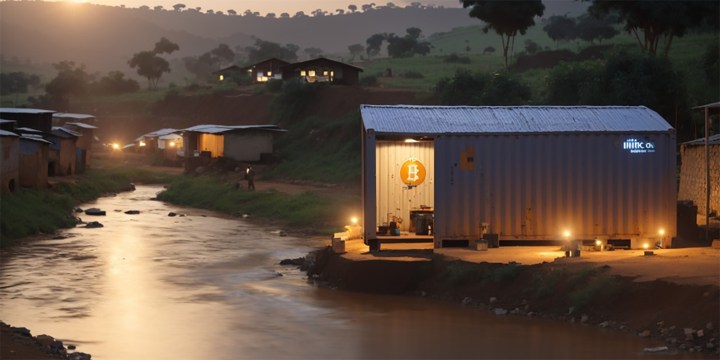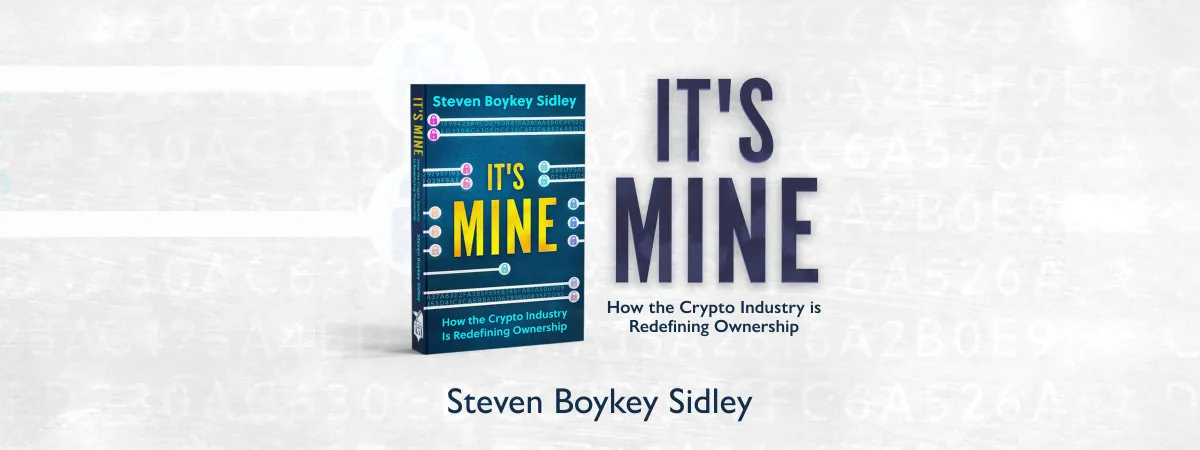GUEST ESSAY
The surprising, simple answer to Africa’s rural energy problems – Bitcoin mining

Small Bitcoin mines can be immediately profitable, and can therefore fund a renewable minigrid and supply power to the community at no cost. And, if this seems too good to be true, it gets even better.
First, some numbers, and they are pretty shocking. According to the International Energy Agency, 600 million Africans (43%) have no access to electricity. Neither are they likely to get access to electricity. Why?
Because it is expensive to erect pylons, string cable and build substations to distribute electricity to small communities or villages in far-flung areas – the capex costs overwhelm the return, especially given the light demand in areas without industrial activity of any kind.
This means the only way to electrify those areas is with minigrids powered by renewables, usually between 20kW and 1MW, depending on the size of the community. But here, too, are many challenges.
A recent paper by The Green Africa Mining Alliance lays out the scale of the task.
“… [T]he number of minigrids in Africa needs to grow from 3,100 in 2021 to 160,000 in 2030, more than 50 times over nine years, with a cumulative investment of $91-billion by 2030.
“If the current pace of minigrid development continues, only about 44,800 minigrids will be installed by 2030, serving only around 80 million people in Africa.”
We first have to recognise some of the economic peculiarities of renewable minigrids in rural areas.
One is that community demand peaks from 6-9pm when the sun goes down. So the grid has to be “overbuilt” to handle that critical period. While consumption is likely to grow over time as energy-consuming businesses start to cluster around the available energy, the initial period of the build and deployment is at the apex of financial risk, with high upfront costs to satisfy community peak demand and then a long and unpredictable wait for new business customers to come on to the grid and pay for it.
Commercially minded investors take one look at this equation and quietly leave the room.
This means that the only way to electrify these underserved communities is to rely on development/aid institutions or governmental “universal” access programmes to fund renewable-powered minigrids. But, sadly, most governments in Africa do not have the fiscus, nor will nor execution capacity.
Most development institutions are both stretched across many demands and extremely slow to move from aspiration to funding. Worse, they are often subject to the whims of politics.
In short, whatever help is coming to these communities is nothing more than a dribble, consigning hundreds of millions to lives of exclusion. It is no surprise that many of the minigrid initiatives promised on paper for decades have simply withered on the vine.
An answer
There is a solution to all of this, and the calculus is simple.
The first piece of the calculus is that rural communities are often close to rivers, a critical natural resource for poor, underserved, under-employed and mainly subsistence communities. Additionally, Africa benefits from an abundance of sunlight over most of the continent.
Two rich, renewable energy resources, almost entirely stranded and unused – solar and hydro.
The critical second item of the calculus is the lack of an anchor tenant who will buy electricity reliably and hungrily, such as a large industrial plant. Sadly, such businesses have no reason to come to these places.
So what is going to use the stranded renewable energy, and happily pay for the renewable minigrids from flowing water and abundant sunlight, powering up surrounding structures with lights and TVs and ovens and chargers?
Bitcoin mines, that’s what.
Bitcoin mines need power to run. Even small mines can run profitably if the power is cheap. And in this case, the power is free – from unexploited renewable sources.
A single container of computers running Bitcoin mining software can be profitable because the only real cost is electricity. The other costs (the machines, the air-conditioning, the cables, the solar panels or water turbines) are negligible by comparison.
Small Bitcoin mines can be immediately profitable, and can therefore fund a renewable minigrid and supply power to the community at no cost. And, if this seems too good to be true, it gets even better.
The Bitcoin mines can reduce their consumption at the flick of a remote switch, making them perfect load balancers for the 6-9pm spike, or any other reason.
Why does this seem like magic? Because standard energy demand requires the transport of power to population centres to find a consumption market (both citizens and industry); it is they who pay for the electricity which funds generation and distribution. That is the way it works, even for big renewable projects – their electrons end up mainly flowing to population centres.
But Bitcoin mines are happy to churn away far from cities and towns, quietly securing crypto transactions and producing revenue.
Bitcoin mines are unlike any other industry. They can live anywhere. And, if the energy is stranded, uncontested and free, you have a perfect marriage where everyone benefits – the community, the investors, even the Bitcoin bros.
Unlike any other buyer of bulk electricity, Bitcoin mines are a buyer of first resort (when no one else is buying), a buyer of last resort (when there is no other demand) and a grid balancer of last resort, keeping the grid stable at all times. No other energy-consuming enterprise has this profile.
Bitcoin mines have been slowly moving into this space, with multiple projects under way (with companies like Bitcoin Lake in Rwanda and Gridless in Nigeria).
It can only accelerate – they are extremely fast to set up and face fewer regulatory hurdles than larger renewable initiatives which feed into a national grid.
This is a delicious irony, given the number of furious and outraged column inches dedicated to Bitcoin’s energy usage over the past couple of years, when in fact it is likely to be part of the solution for the rural poor, excluded and energy deprived. DM
Steven Boykey Sidley is a professor of practice at JBS, University of Johannesburg. His new book, It’s Mine: How the Crypto Industry is Redefining Ownership, published by Maverick451 in SA and Legend Times Group in the UK/EU, is available now.



















Give this man a Bells!!
Well done sir- great writing and a simple explanation for those who have previously been told otherwise.
Ie: don’t ask a hotel owner about Airbnb,
Don’t ask a taxi owner about Uber, don’t ask Ster Kinekor about Netflix!
👍🍺🍺
Will altruistic VC or Angel investors pump prime the localised infrastructure builds, manage the regulatory noise and drive rural collaborative to kick start? There must be takers for this surely? Nice article Boykie.